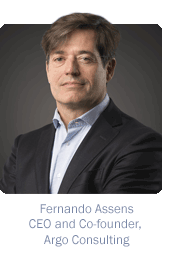 Global manufacturing and private equity are rapidly changing, and companies are having to undergo strategic operational transformation and redesign their entire business processes, which, of course, means opportunities abound for consultants. Consulting caught up with Fernando Assets, CEO and Co-Founder of operations firm Argo Consulting, which specializes in industry and private equity, to talk about some big trends and changes in private equity and manufacturing.
Global manufacturing and private equity are rapidly changing, and companies are having to undergo strategic operational transformation and redesign their entire business processes, which, of course, means opportunities abound for consultants. Consulting caught up with Fernando Assets, CEO and Co-Founder of operations firm Argo Consulting, which specializes in industry and private equity, to talk about some big trends and changes in private equity and manufacturing.
Consulting: What's happening in the world of private equity?
Assens: In my opinion the biggest change in the private equity industry has been the shift in focus from financial engineering to operational improvement. In the early days of private equity, firms focused mostly on adding leverage, optimizing capital structure, and minimizing taxes. But those were the days when PE firms could acquire a mid-market firm for 5-8 multiples of EBITDA. Today, with valuations frequently reaching 10-12 multiples, operational improvement has become a fundamental piece of value creation.
Consulting: How does that improvement factor into investment decisions?
Assens: From the point of view of a private equity firm, and for as long as valuations remain high, the issue is not just how much they pay for a company, but how much they can improve it. Even if they overpay, if 5 years later they are able to sell the business for the same EBTIDA multiple, they can still do fairly well provided they have added significant profitability to the company, which typically can only be done by operational transformation. Historically PE firms considered operational improvement as "gravy", nice to have, but not critical. But today it is quite the opposite. In many acquisitions it will be impossible to justify the valuation unless there is a significant EBITDA improvement opportunity from operational transformation. Operations is no longer "gravy", now it's a critical ingredient of the investment thesis.
Consulting: What are the big consulting opportunities for firms with private equity clients?
Assens: If you look at the people who run most private equity firms, they tend to have a finance or strategy background. And as a reflection of their own background, they have traditionally hired large strategy consulting firms, even for operationally focused projects. But over the last few years this has changed. PE firms have grown disappointed with the ability of the large strategy firms to conduct operational due diligence and operational transformation, and have increasingly hired boutique operations firms because they need someone who gets their hands dirty, they don't need advice, they need someone who "can do it". We've picked up close to a dozen clients we had never done work with before because they had grown disillusioned with firms who didn't specialize in the type of hands-on implementation we do. If you look at the type of consultant we hire, we hire people from industry in their 40s and 50s with many years of hands-on experience. People who have run plants, people who have run businesses.
Consulting: What about a big trend you're seeing in manufacturing?
Assens: In pretty much every industry sector the trend is for increasing product variety. Everything from the flavors of yogurt you can buy, to industrial equipment, or even the variety of seats you find on a bus. For instance, we are currently working with a company that manufactures seats for public transportation. Years ago, every seat on a bus was the same type. Today, a bus has as many as 24 different seat types. So even in very simple products the variety and complexity of the product mix has grown exponentially. But most companies have not been able to adapt their manufacturing and design practices to manage the complexity. Companies have to change the way they manufacture products from a standard product to a highly customized one. Adapting those design and manufacturing processes to cope with the high complexity and still be able to do it in a cost-effective way, both in materials costs and in labor costs.
Consulting: What are some of the biggest challenges for manufacturing firms?
Assens: I believe we're entering the third Renaissance of Lean Manufacturing. The first was driven by the automotive industry, and for years the focus in the industry was the implementation of the Toyota Production Systems. The second Lean revolution was when those lean techniques moved outside automotive to all other industries. The third wave is now, driven by technology and increased product variety. Twenty-five years ago, when I started my career as a consultant, I focused on implementing Lean Manufacturing. All the client people we trained who became experts in Lean have moved on. Many companies have lost their Lean expertise. Another concern is that young graduates are not necessarily looking at manufacturing as an industry where they believe they can have a stable career. If you look at where graduates of the top business schools end up, not a lot chose manufacturing. The result is that companies have lost the knowledge and are not attracting the best talent.

